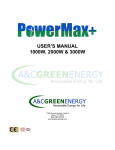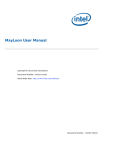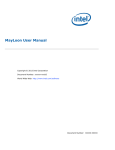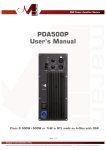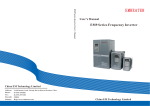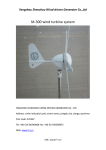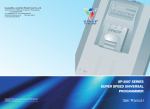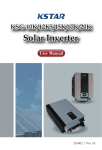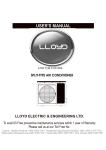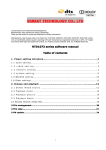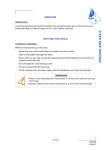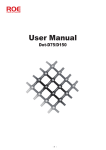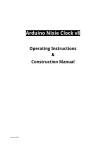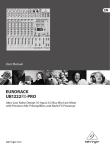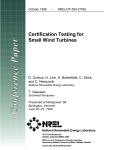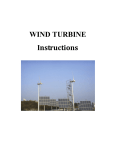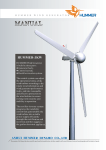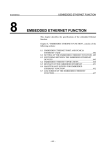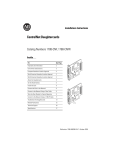Download USER`S MANUAL
Transcript
Yangzhou Shenzhou Wind-driven Generator Co.,Ltd USER’S MANUAL (2007-04-13) Yangzhou Shenzhou Wind-driven Generator Co.,Ltd Add: Xinhe Industrial Park, Xiannv Town, Jiangdu City, Jiangsu Province Post code: 225267 Phone: 0514-6292873 Fax: 0514-6290873 Website: http://www.f-n.cn E-mail: [email protected] 1 CONTENTS Model & Parameter List ┅┅┅┅┅┅┅┅┅┅┅┅┅┅┅┅┅┅┅┅┅┅┅┅┅┅┅┅┅┅┅┅┅┅┅┅┅┅┅┅┅┅┅┅┅┅┅┅┅┅┅┅┅┅ 3 ┅┅┅┅┅┅┅┅┅┅┅┅┅┅┅┅┅┅┅┅┅┅┅┅┅┅┅┅┅┅┅┅┅┅┅┅┅┅┅ 5 Installation Specification of Guyed Tower Installation Specification of Tapered Tower Configuration Specification of Batteries ┅┅┅┅┅┅┅┅┅┅┅┅┅┅┅┅┅┅┅┅┅┅┅┅┅┅┅┅┅┅┅┅┅┅┅┅┅┅ 13 ┅┅┅┅┅┅┅┅┅┅┅┅┅┅┅┅┅┅┅┅┅┅┅┅┅┅┅┅┅┅┅┅┅┅┅┅┅┅┅┅ 15 Electric Wiring ┅┅┅┅┅┅┅┅┅┅┅┅┅┅┅┅┅┅┅┅┅┅┅┅┅┅┅┅┅┅┅┅┅┅┅┅┅┅┅┅┅┅┅┅┅┅┅┅┅┅┅┅┅┅┅┅┅┅┅┅ 16 Maintenance FAQS ┅┅┅┅┅┅┅┅┅┅┅┅┅┅┅┅┅┅┅┅┅┅┅┅┅┅┅┅┅┅┅┅┅┅┅┅┅┅┅┅┅┅┅┅┅┅┅┅┅┅┅┅┅┅┅┅┅┅┅┅ 17 ┅┅┅┅┅┅┅┅┅┅┅┅┅┅┅┅┅┅┅┅┅┅┅┅┅┅┅┅┅┅┅┅┅┅┅┅┅┅┅┅┅┅┅┅┅┅┅┅┅┅┅┅┅┅┅┅┅┅┅┅┅┅┅┅┅┅ 17 Annex one: Off-grid Electric Wiring ┅┅┅┅┅┅┅┅┅┅┅┅┅┅┅┅┅┅┅┅┅┅┅┅┅┅┅┅┅┅┅┅┅┅┅┅┅┅┅┅┅┅ 19 Annex Two: Controller Specification(3kw & above 3kw) ┅┅┅┅┅┅┅┅┅┅┅┅┅┅┅┅┅┅┅┅┅┅┅┅┅┅┅┅┅20 Annex Three: Specification of wind-speed monitor ┅┅┅┅┅┅┅┅┅┅┅┅┅┅┅┅┅┅┅┅┅┅┅┅┅┅┅┅┅┅ 22 Annex Four: Specification of Analyzing System for Wind-speed Gathering ┅┅┅┅┅┅┅┅┅┅┅┅┅┅┅ 27 2 Model & Parameter List Model FD2.1-200-8L FD2.1-200-8H FD2.5-300-8L FD2.5-300-8H Rated power(W) 200W 300W 300W Rated voltage (V) 24 24V 24V 2.5 2.0 2.5 2.5 Rotor diameter(M) 2.2 1.8 Start-up wind speed(m/s) 3 Rated wind speed(m/s) 6 12 7 12 Security wind speed(m/s) 16 35 16 35 400 400 glass fiber Glass fiber 3 3 FD3.0-1000-10L FD3.0-1000-10H Rated rotating rate(r/m) Blade material 450 glass fiber glass fiber Blade quantity Model 3 FD2.7-500-10L FD2.7-500-10H Rated power(W) 500W 1KW Rated voltage (V) 24 48 Rotor diameter(M) 2.5 2.1 Start-up wind speed(m/s) 2.7 2.3 2 2 Rated wind speed(m/s) 8 12 9 12 Security wind speed(m/s) 16 35 16 35 Rated rotating rate(r/m) Blade material 400 glass fiber glass fiber Blade quantity Model 400 glass fiber glass fiber 3 FD3.6-2000-10L 3 FD3.6-2000-10H FD5.0-3000-16L FD5.0-3000-16H Rated power(W) 2000W 3000W Rated voltage (V) 120 240 Rotor diameter(M) 3.2 Start-up wind speed(m/s) 2.5 4.5 2 3.6 2 Rated wind speed(m/s) 9 12 10 12 Security wind speed(m/s) 16 35 25 45 Rated rotating rate(r/m) Blade material Blade quantity 400 glass fiber 220 glass fiber 3 glass fiber glass fiber 3 3 Model FD6.4-5000-16L FD6.4-5000-16H FD8.0-10K-20L FD8.0-10K-20H Rated power(W) 5000W 10000W Rated voltage (V) 240 240 Rotor diameter(M) 6.4 Start-up wind speed(m/s) 4.5 8.0 2 6.4 2 Rated wind speed(m/s) 10 12 10 12 Security wind speed(m/s) 25 45 25 45 Rated rotating rate(r/m) Blade material 200 glass fiber Blade quantity glass fiber 3 Model FD10.0-20K-40H Rated power(W) 20000W Rated voltage (V) 360 Rotor diameter(M) 10.0 Start-up wind speed(m/s) 2 Rated wind speed(m/s) 12 Security wind speed(m/s) 45 Rated rotating rate(r/m) 90 Blade material glass fiber Blade quantity 3 180 glass fiber glass fiber 3 4 Installation Specification of Guyed Tower Step 1: Choosing Installation Sites The wind turbine should be erected high and far away from obstacles as possible in order to get relatively high wind speed. Meanwhile soil quality of installation location should be taken into consideration. Loose sands, uneven or easily influenced by weather condition areas should be excluded from installing the wind turbine. When selecting the locations, it ’s necessary to consider the distance between generator and pile. The shorter the distance is, the less cable would be used. As a result, less energy waste would be produced during the transmission. While under the circumstances of longer distance, it’s better to use much thicker standard cable for the transmission. Step 2: Layout of Tower, Base & Anchor (as shown in the following tables) Model 200W 300W 500W 1000W 2000W Semi diameter(m) 2.0 3.0 3.0 3.0 4.0 Size of central base(m) (long*wide*deep) 0.4*0.4*0.3 0.5*0.5*0.4 0.6*0.6*0.5 Size of side base (m) (long*wide*deep) 0.3*0.3*0.3 0.4*0.4*0.3 0.5*0.5*0.4 Model 3000W 5000W 10KW 20KW Semi diameter (m) 4.0 6.0 6.0 8.0 Size of central base (m) (long*wide*deep) 0.8*0.8*0.8 1.0*1.0*1.0 Size of side base (m) (long*wide*deep) 0.6*0.6*0.6 1.0*1.0*1.0 Table 1 5 Special attention should be paid to the following when laying out the base and anchor: 1. Connecting line of two side anchors should be in parallel with the connection of two pinholes on the tail edge. 2. Make sure the side of tail edge with screw thread face the anchor. 3. The height of anchor should be consistent with the height of tower base. Therefore, the pulling force between fixed cable wires should be balanced for the sake of easy adjustment. Otherwise, too tight or too loose fastening pull will lead to the curvature or even breakdown of tower while erecting the tower. Step 3 Concrete the Foundation of Base as well as Anchor and Install Tower Base 1. Follow the layout of the above step, dig the concrete construction holes. Please refer to the chart one above for the size of the holes. 2. C25 concrete should be available. Four anchor bolts will be installed according to the holes on the base. Attention to make sure they are consistent with base holes. Fix the base with bolts on the cement done before (as shown in the graph 2). 6 Graph 2 3. Annular anchors need to be deposited 60°to 80°along the base direction and check the distance between the four hooks of the anchors and the center of the base. Four anchors should be horizontal (as shown in the graph 3). Graph 3 7 Step 4 Assembly of the tower and wind turbine 1. First, insert the main section of tower into base, then insert the axis pin into base and insert the split pin. (As shown in the graph 4) Graph 4 2. Connect each section of tower one by one, place the tower on the supporting stand after assembly. 3. Rip the generator and dogvane cables into the tower, and elicit the cables from the main section of tower, near the tail edge. 4. Fix the running flange and tower flange by bolts. Hoist it by equipments such as pulleys, chain block etc. Pay attention that the generator axis should be faced upward in order to install the blades. 5. Install the blades and cover the pressure pad (300W wind turbine having no pressure pad), then screw the bolts. Keep the balance of blades when install them. First, do not screw the bolts too tight, adjusting the distance between two blades’ tips to be equal after screwing all the bolts. (as shown in the graph 8 5) Graph 5 Make sure: L1=L2=L3 (error allowed: ±5mm) Utilizing spanner for force moment when screwing blades’ bolts and achieving the set force moment (200w、300w:15Nm±1;500w、1kw、2kw:30Nm±1;3kw、5kw、10kw、20kw:50Nm ±1) Note: Please keep to the above make-sure. If not, we are not responsible for any possibility of breaking down the blades or flange. 6. After adjusting the equal distance between the blades’ tips, screw down the bolts according to the order as shown in the graph 6 (300W having three blade bolts, screwing them down one by one) 9 Graph 6 7. Cover the dome. 8. (For 3kw and above 3kw wind turbine) infix the aviation plug on the generator into the socket of dogvane, and then install the dogvane. Special attention should be paid to the direction of dogvane. All the five holes must be face-to-face. Step 5: Preparations before erecting the tower (For 3kw and above 3kw wind turbine) 1. Fix the fixed cable wire on the tower. The cable wire (both right and left sides) should be directly connected to side anchor through turnbuckle. Cable wire behind should be fixed on back anchor according to the same length. Make sure there is no twist among the three cable wires 2. Connecting the two supporting poles. 3. Fix the two relative thin cable wires on the two ears of supporting pole, and then make the cable wire before the tower drill through the two ears, and fix them after putting into the upper pulley. 4. Insert the supporting pole into the tower. The cable wire on the two ears should be fixed on the two side anchors, and then fixed by tighter. 10 5. Fix the lower pulley on the front anchor. Fix one side of the longest thin cable wire on the pulley of supporting pole. Make sure the other side drill through the pulley, and then drill through the upper and lower pulley. Finally, fix it on a hoist or tractor (as shown in the graph 7). Graph 7 (For 2kw & above 2kw) 1. Connect the last fixed wire cable to the one which is at least 16 meters. Tie one end to the winch or tractor. 2. Drill the wire cable or bracing cord through one end of the ladder (2*4 or 2*5), which will be served as support pole Step 6: Erecting the tower 1. Drive the winch or tractor slowly and the tower will stand up along the moving of the cord. Stop at each rising 15°and check the tensile force of wire cable on both sides. Any over tight or loose wire should be regulated by putting down the tower slowly and adjusting the length of wire cable. 11 2. Go on pulling the bracing cord until the tower stands upright. Separate the working cord and fix it on its anchor. 3. Check and adjust the strain of each fixed wire cable. Over tight force may bend the tower while over loose force may cause the tower unstable and shakable. The perfect force is neither too loose nor too tight and can be adjusted through circumrotating the bolt. Installation specification of taper tower Step 1: Choosing installation sites Please refer to the installation specification of guyed tower (Step 1) Step 2: Concrete the base Refer to the following graphs according to the different product model. Special attention should be paid to the consistent between anchor and the opening of tower base. Graph 8 12 Model Code in the 1000W 2000W 3000W 5000W 10KW 20KW graph 8 Ground depth(m) ( D1) 1.2 1.5 1.5 1.6 2.0 3.0 Ground diameter(m) ( C1) 1.0 1.0 1.2 1.5 1.8 2.5 Burial depth of cotter bolt (m) ( D2) 0.8 1.2 1.2 1.2 1.6 2.0 Layout diameter of cotter bolt ( C2) 450 600 600 700 1000 1200 Specification of cotter bolt ( T) M18 M18 M20 M24 M24 M30 Quantity of cotter bolt ( N) 12 12 12 12 16 16 (mm) Table 2 Step 3: Assembly of tower and generator Please refer to the installation specification of guyed tower (Step 4) Step 4: Hoisting the tower A hoist is needed while installing the guyed tower, which will be proceeded by professional personnel. Non-working people should be far away from the site when hoisting. 1. Utilized by supporter on the upper side of pole and hoist gradually. 2. When the tower has been erected, face the open hole on tower base to the cotter bolt and screw down the bolt nut. Configuration Specification of Batteries 1. Batteries should be placed inside buildings under dry and constant temperature. After finalizing the quantity of batteries in series, it is necessary to have a design to place the batteries, controller and inverter. 2. Connect the batteries in series. The concrete way is to connect the anode of first battery to cathode of the second one. 3. Make the joints greased. Install the fuse on the positive electrode of battery. The distance of conducting wire between batteries and controller should be less than 3m. 13 4. Suggested battery capacity for various model (as shown in the table 3) Model 200W 300W 500W 1000W Voltage of single battery (V) Capacity of single battery(AH) 2000W 3000W 5000W 10KW 20KW 12 100 200 200 200 150 100 200 400 800 2 2 2 4 10 20 20 20 30 Quantity in series Table 3 5. Charged parameter of batteries (as shown in the table 4) Battery voltage(V) 12 24 36 48 120 240 360 Float charge voltage ( V) 15 30 45 60 150 300 450 Overvoltage ( V) 15 30 45 60 150 300 450 Over charge resume voltage ( V) 14 28 42 56 140 280 420 Undervoltage ( V) 10.5 21 32 42 105 210 315 Under charge resume voltage ( V) 12 24 36 48 120 240 360 Table 4 Electric Wiring 1. Off-grid electric wiring (annex 1) To ensure the safety and easy maintenance, please install the switch and fuse according to the diagram. Make sure there are consistent among the output voltages of generator, battery voltage and input voltage of inverter. A wire-connecting mistake will lead to burn down the generator, batteries and inverter. (Special attention to 3kw & above 3kw) a. There are two cables elicited from the generator head. One is the cable of wind direction signal with aviation plug on cable head. You need to insert it into the socket. The other cable is for the output of generator power and controlling signal. There are five lines with three relative thick ones for generator output and the other two relative thin ones for controlling signal, which is 14 classified as positive electrode and negative one. All should be connected to the connecting poles at the back of controller accordingly. b. The anemoscope should be installed on house roof or open areas, and must be vertical against the ground. One end of the matched cable of anemoscope should be inserted into the socket under the anemoscope with the other end inserted into the socket accordingly. c. Please refer to annex 2 for controller specification 2. On-grid electric wiring All the models can be applied to on-grid environment. But it is approved by local regulations. What is more, on-grid controller and inverter need to be purchased additionally. Maintenance Wind turbine may be operated under extremely harsh environment, or meet various complicated weather. Therefore, fix- date examination and maintenance are necessary in order to keep the system operate rightly. Do the following check every three months: 1. Check the tight wire is too loose or too tight, and adjust them, in particular in initial stage of installation and post-gale. 2. Check whether or not the wire is damaged or loose. The joints are loose and rusted or not in order to secure electrical safety. 3. Maintain the batteries following the battery manual. 4. Before storm, it is better to lay down the tower for escaping from unpredictable loss 15 FAQS ○ Why does not my electro-equipment work after connected to inverter? ● Check the dump energy. If the energy is not enough, the system will not operate normally; if the energy is enough, please check the connecting wire between batteries and inverter is correct. ○ Why can not the batteries be charged? ●Check whether or not the rotor is rolling, the generator have no output at too high or too low wind speed. If the rotor is normal, disconnect the generator's wire from batteries and controller (if there is an individual controller); check the output voltage of generator by a multi-meter. If the voltage is normal please check the batteries is ok, otherwise check the wire of generator. ○ Why does not the rotor roll at a normal wind speed? ● If the output wire of generator is short, the rotor will not roll. Check the generator's wire after disconnected from batteries. ○How to lay down the generator? ● (For 3KW & above 3KW) 1. Firstly we should stop the generator. Change control manner to "manual", and then hold on the "reverse" or "turn" to make the generator turn a 90 angle with wind direction。 2. After the blades stop rolling, shortcut three line of generator. 3. Hold on the "reverse" or "turn" to make the generator's end face to the direction of putting. 4. Do the reverse steps of installation to put down the generator. 16 (For 2KW & above 2KW) 1. Disconnect the generator and controller. Make the three output lines be short circuit to prevent the blades from further running. 2. Do the reverse steps of installation to put down the generator. ○ Can I enlarge the batteries' capability to extend the available time for electrical appliance? ● Enlarge the capability of batteries we suggested would make the batteries on half full state and short the life. ○ Wind turbine (3kw & above 3kw) can not trace wind direction automatically. ●1. Check whether the anemoscope is broken or not. The concrete way is to examine whether there is wind-speed indicator on controller; 2. Check whether the dogvane is broken or not. The concrete way is to unplug the plug of dogvane from controller, and you will see there are three line on dogvane with marks ①、②、 ③ . Measure the resistance between ① and ② by multi meter, the resistance should be appropriately 1000Ω, and then measure the resistance between ① and ③, along with ② and ③. The resistance figure of these two(① and ③+② and ③) should be equal to the resistance figure between ① and ②. 3. If no problem exist the ahead two procedures, check whether the controller board has been set on “auto”. Otherwise, it can not trace the wind direction automatically. If you can not trace the wind direction, the reason causing this is mostly for low wind speed. Only when the wind speed is larger than 3m/s staying more than 30seconds, can you trace wind speed and change windward angle. ○ How long is the generator's lifespan? 17 ●It’s 15 years under normal care. If you have more questions, please contact us by phone or E-mail. * The color of photographs may be different from real objects. * No notification if the manual modified. *The guarantee of turbine and controller is 2 years, and the inverter is 6months from the date of purchasing (non-done by man or majeure) 18 Annex 1: Off-grid electric wiring 19 Annex Two: Controller Specification(3kw & above 3kw) 1. Under initial state, controlling board will indicate “auto” and “turn-on”. When the wind speed reaches or surpasses 2m/s under this state, wind turbine will trace wind direction automatically. If the batteries are full or the wind speed is too strong, the turbine will furl automatically until shutdown. 2. We can also set the windward mode on “manual” and adjusting wind direction by pressing “forward” or “reverse” the direction. When the wind speed is too strong or the batteries are charged fully, the turbine will not shut down automatically. 3. When we do not need the operation of wind turbine, you can choose to press the button of shutdown or turning-off. Then the turbine will automatically face wind and achieve shutdown. 4. The system will continuously check the batteries’ voltage when the system is under normal state of generating power. The system will alarm automatically when over voltage or under voltage. When over voltage, shutdown order will be sent out. The over-voltage alarm is set on 300V, alarm voltage cancellation 280V and under voltage alarm 210V when it leaves factory. 5. The function of anemoscope is to check the real time wind speed. The state will be on “working” or “non-working” checked by. Under working state, the system will automatically face wind and generate electricity. There are “non-wind” and “over-wind” under “non-working” state. When under “non-wind” state, the system moves into sleeping state. When under “over-wind” state, the system will immediately send out furling order. The system will go into shutdown. Following table is the setting when leaving factory: Model 3000W 5000W 10KW 20KW Furl 30 degree 12m/s 12m/s 12m/s 13m/s 20 Furl 60 degree 15m/s 15m/s 15m/s 16m/s Furl 90 degree(shutdown) 18m/s 18m/s 18m/s 20m/s Table 5 6. The system will continually check battery voltage under normal operation state. When over or under voltage, the system will alarm automatically and send out the shutdown order. Note: anemoscope should be installed on the wind turbine system of 3KW and above 3KW, otherwise the system will not be operated normally. 21 Annex Three: Specification of wind-speed monitor (FS01) The function of wind speed scope is to indicate the real time wind speed and wind scale, together with alarming when the wind is weak or strong. It consists of wind speed sensor (FS10), wind speed scope (FS100) and connecting wire. The users can learn the local wind resource with the help of this system. Front of wind speed scope (Picture 9) Picture 9 Back of wind speed scope & wire-connecting way (Picture 10) 22 Picture 10 Wind speed sensor (FS10) (Picture 11) Picture 11 Structural features (Picture 12) 23 1 风 速 仪 2 Wind Speed : 08.4m/s 5 level 工作 过风速 欠风速 功能 数字 移位 3 4 5 Diagram 12 Specification of each part 1) Anemoscope board 2)Liquid crystal: turn-on, the background light is on. (It will shut down automatically after 5 second if there is no operation.) Wind speed figure is displayed, such as 8.4m/s. and wind scale, such as 5. 3)Operation indicting light: The green light is on if it is under normal operation. 4)Under wind speed(Wmin) indicating light: When the wind speed is under W≤Wmin state, there will be alarming. Press any key will make the alarming sound nonexistent. 5)Over wind speed (Wmax) indicating light: When the wind speed is under W≥Wmax state, there will be alarming. Press any key will make the alarming sound nonexistent. 6)Function key: after pressing this key, you will enter into the menu of setting parameter; at this time, the cursor will shine on the first figure. 7)Figure key: Under the state of setting parameter menu, press this key, the figure where the cursor shines will be increased by one; press this key continuing, requisite figure can be set. 8)Shift key: Under the state of setting parameter menu, press this key, the cursor will be switch 24 among different figures; combined with figure key, you can set the requisite Wmin, Wmax and the return difference. 2 Parameter setting: a. Press the function key, and you will enter into the setting menu of Wmin and Wmax (as shown in the diagram 13). Unit: m/s; the cursor shining on the second figure 2; press shift key, modify the figure; press the figure key to modify the figure. b. When the above procedures have been done, press the function key once again, and you will enter into the setting menu of Wmin and Wmax (as shown in the diagram 14). Setting way is the same as what mentioned in (a). c. After having all the figures set, press the function key once again; the liquid crystal will display the menu: parameter has been set. Over Speed: 25.0 Under Speed: diagram 18 Diagram 13 03.0 Over Speed: 20.0 Under Speed: 05.0 diagram 19 Diagram 14 3 Alarming & relevant display 1)Over wind speed alarming (wind speed W≥Wmax): e.g.: (diagram 15): background light is on, alarming; meanwhile, over wind speed indicator light is on. When under the state of W<Wmax-, the alarming will be unchained. Wmax-: return difference of over wind speed. Wmax- <= Wmax should be set. 25 Wind Speed: Hight 16.5m/s 7 level Diagram 15 Note: “wind speed High” means the wind speed is too high. “16.5m/s” means wind speed is 16.5m/s. “7 level” means wind scale is 7. 2)Under wind speed alarming (wind speed W≤Wmin): e.g.: (diagram 16): background light is on, alarming; meanwhile, under wind speed indicator light is on. When under the state of W>Wmin+, the alarming will be unchained. W min+: return difference of under wind speed. W min+ >= Wmin should be set. If under wind speed alarming is not needed, please set W min+ and Wmin on zero. Wind Speed: Low 02.2m/s 2 level Diagram 16 Note: “wind speed Low” means the wind speed is too low. “02.2m/s” means wind speed is 02.2m/s. “1 level” means wind scale is 1. 3) Press any key, and the alarming sound will be unchained. But the indicator light is still on. The background light will be on again when alarming. 26 Annex Four: Specification of Analyzing System for Wind-speed Gathering (FS02) The system of measuring wind consists of wind-speed sensor (FS10), dogvane (FS20), data collector (FS200) and matched cable. Usually, data collector (FS200) can display the information of wind speed, wind direction and set the parameter. Meanwhile, following is going to show you the procedure of connecting the wind-measuring system and computer. FS200 is served as measuring and recording wind speed and wind direction (ready for use). It has capacity of cycle record of 8000 history record. Targeted-design nixie tube, liquid crystal screen and keyboard contribute to the easy and convenient operation of FS200. It can also communicate with computer, that is, to record the data of wind speed and wind direction to computer, which will be observed and analyzed by FS200. Feature: 1. Running mode of low power consumption: FS200 will automatically turn off the nixie tube and the liquid crystal screen, so it can run in mode of low power consumption. 2. Wind cup of the dogvane sensor is made of carbon fiber, which enhances strength and contributes to start the equipment. Technical index Measuring range:Wind speed: 0~60m/s ±0.3m/s Accuracy: Power supply: Wind direction: 0~360° ± 3° AC 220V±20% 50HZ,DC12V、5V are for choice. Recording interval: Communicating joint: 1min to 60mins RS-232 Operating environment temperature: -40℃~50℃ 27 Installation & Connection 1. Wind-speed sensor installation Install the wind-speed sensor on the supporting frame. If there is wind available, the three cups of wind-speed sensor will run. 2. Connection of FS200 and wind-speed sensor Insert the aviation plug of wind-speed sensor ’ signal line into the aviation socket of FS200. 3. Connecting FS200 to power supply 12V power supply is applied to FS200. Connect FS200 TO 12V power supply. Special attention paid to the anode and cathode, do not reverse them. Check the wind-speed sensor, connection between wind-speed sensor, and correct connection of FS200 power supply. If there is no problem concerning these aspects, you can electrify. When FS200 are running, the present wind speed is displayed on nixie tube while the present wind direction is displayed on liquid crystal screen. PH3000 Operation 28 Picture 17 Note: Illumination: the four direction key control the move of cursor, press”→” to enter the menu option, press “←” to return to the up menu, press”+”(“-”) to increase( decrease) the parameter. MENU (Picture 18) Picture 18 System time setting (Pic19) Picture 19 “+””-“ to change the system time, “←” to exit the set of system time ,then auto update the 29 system time. Record interval (Picture 20) Picture 20 It is used to set interval of the history data, 1min~60min adjustable. Supposed that it is set 2minute, and then the time of PH3000 can record is: 8000/30min/24 hours = 11 days Alarm set (Picture 21) Picture 21 When wind speed exceeds the upper limit, relay is closed then alarm. The function is optional. Local address (Picture 22) 30 Picture 22 It is used when communication with computer. It correspond to the weather station ID of the computer software. After right set, the PH3000 can work persistently. Connection of FS200 and computer Connect the RS232 serial of FS200 to the RS200 serial of computer and have the FS2000 computer software run. The PH computer software is served as reading the present wind direction checked by dogvane. Download the history data of wind direction saved by dogvane and save the history data to the database of Microsoft ASSEDD. Analyze the data through table or curve view. The computer software can also set the parameters of the real time clock and history data recording interval of the dogvane. Operation of software FS200 (diagram 23) 31 Diagram 23 Choosing weather station System default the weather station 10, which is consistent with the address of wind-speed dogvane. Open serial Choose the serial, and set the communicating baud rate on 9600bps, and then open the serial. Read the setting data Click the button of downloading the present setting to read data of the present wind speed and wind direction. Or click pane before the words “update the setting data automatically”, and then choose the time interval of updating automatically. The software will read the present wind speed and direction automatically at a regular time. 32 Download the history data Read the history data of anemoscope by clicking the button of reading history data. The history data are saved in the database of Microsoft Access. Users can observe and analyze history data of wind speed by table or curve view. Setting system parameter (Diagram 24) Diagram 24 Serve as reading or setting the system parameter of anemoscope. The system parameter of anemoscope includes clock parameter, time interval of history record and alarm set. Setting of supporting angle (Picture 25) 33 Diagram 25 Curve view (Diagram 26) First of all, choose the date scope of historical record you need to check, and then click the curve view. The curve diagram of history record will be shown. There are two types of displays, namely, overall display and partial display. Diagram 26 Read the concrete parameter with the help of a rectangular. Rose diagram of wind (Diagram 27) 34 Rose diagram of wind can illustrate the distribution and scope of different wind direction all the year round. Diagram 27 35




































